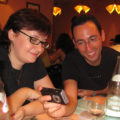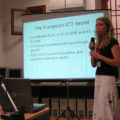“All societies throughout history have had work right at their center; but ours – particularly America’s – is the first to suggest that it could be something other than a punishment or penance. Ours is the first to imply that a sane human being would want to work even if he wasn’t under financial pressure to do so. We are unique, too, in allowing our choice of work to define who we are, so that the central question we ask of new acquaintances is not where they come from or who their parents are but, rather, what it is they do – as though only this could effectively reveal what gives a human life its distinctive timbre.”
Alain de Botton “Workers of the World, Relax”- New York Times, September 6, 2004
An American meeting another American for the first time usually asks: “What do you do [for a living]?” As Botton suggests, this may be because, to an American, what you do for a living is a choice that reveals much about who you are. The question may also (consciously or un-) be intended to establish relative economic status. Personally, I like to know what people do simply to find some connection on which to hang a conversation.
In Italy, the question is so unusual that I’ve stopped asking. For most Italians, most of the time, there’s simply no need to ask: you hang out mostly with your paesani (hometown folks), about whom you already know everything. When you do meet new people, it’s often in the context of work, so again there’s no need to ask.
Italians more often define themselves in terms of where they come from (paese) and who their family is. No one has a choice about these things, but many Italians don’t have much choice about their work, either. They may choose their field of study, but even that is often strongly influenced by the family. When seeking a job, most are heavily constrained by the tight job market and their need, both economic and psychological, to stay close to home – job satisfaction is a very secondary consideration.




